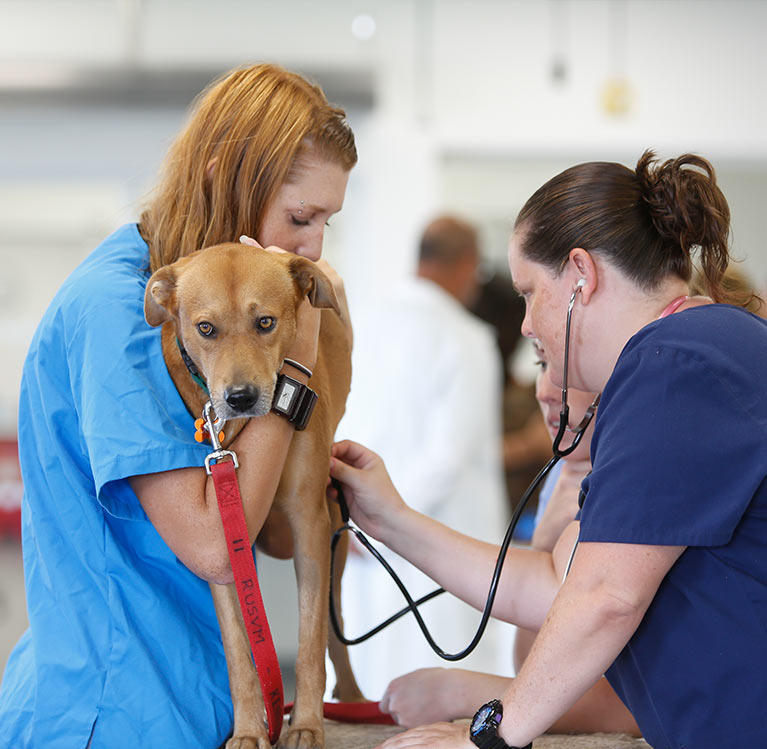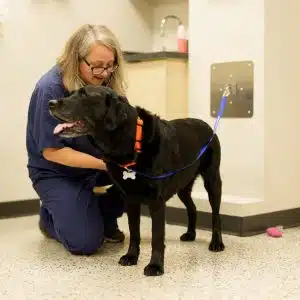Comprehensive Guide to the Services Supplied by a Veterinary Oncologist
Vet oncology includes a vast range of solutions focused on diagnosing and treating cancer in animals. Veterinary Oncology Services. Oncologists use innovative analysis methods and supply different treatment options tailored per pet's requirements. They additionally prioritize helpful treatment and give useful sources for pet dog owners. Understanding these services is essential for making educated choices. What specific aspects of veterinary oncology can significantly influence a pet's treatment trip?
Recognizing Vet Oncology
Veterinary oncology is a customized field concentrated on treating and detecting cancer in pets. This discipline includes a large range of strategies, from medical therapies such as radiation treatment and immunotherapy to medical treatments focused on removing tumors. Veterinary oncologists are trained to acknowledge the special symptoms of cancer in various varieties, enabling them to customize treatment plans to individual patients.
In addition to traditional treatments, veterinary oncology highlights encouraging care, which plays a necessary function in improving the lifestyle for damaged pets. This consists of pain management, dietary assistance, and palliative care options. Collaboration with pet owners is essential, as they are indispensable to decision-making regarding their pets' therapy paths. As research study breakthroughs, vet oncology remains to evolve, supplying brand-new hope and boosted results for pet dogs diagnosed with cancer. In general, this area is essential for resolving the intricacies of cancer cells in buddy pets.
Advanced Diagnostic Techniques
Advanced diagnostic strategies play a crucial role in veterinary oncology, supplying vital understandings into the presence and degree of cancer cells in animals. Imaging methods such as ultrasound, CT scans, and MRI are typically used to imagine growths and evaluate their characteristics. Furthermore, biopsy procedures are essential for getting tissue samples, enabling definitive diagnosis and customized therapy plans.
Imaging Modalities Utilized
Imaging methods play an important role in the medical diagnosis and administration of cancer cells in pets. Vet oncologists make use of different advanced imaging strategies to examine growth metastasis, visibility, and size. Radiography, or X-rays, supplies a preliminary view of bone and upper body conditions, while ultrasound offers real-time imaging of soft tissues, permitting thorough evaluation of interior body organs. Calculated tomography (CT) boosts visualization of intricate anatomical structures and allows 3D reconstructions, helping in accurate lump localization. Magnetic resonance imaging (MRI) is invaluable for soft tissue differentiation, particularly in mind lumps. In addition, nuclear medicine methods such as positron emission tomography (FAMILY PET) aid recognize metabolic activity within growths. Jointly, these techniques improve diagnostic accuracy, guiding effective therapy approaches for oncological people.
Biopsy Treatments Clarified
Adhering to the preliminary evaluation with imaging methods, acquiring a conclusive medical diagnosis often calls for cells tasting via biopsy procedures. Vet oncologists use various biopsy methods based on the lump's area and features. Great needle desire (FNA) is a minimally intrusive method that removes cells for cytological evaluation, ideal for superficial masses. Core needle biopsies give bigger tissue samples and serve for deeper growths, permitting for histopathological evaluation. Surgical biopsies include excising a section or the whole growth, facilitating detailed assessment. These procedures not just verify the visibility of cancer yet also aid determine its kind and grade, leading treatment decisions. Each biopsy method is picked meticulously to balance diagnostic accuracy with individual safety and comfort.
Therapy Choices for Cancer in Family pets
When a family pet is identified with cancer, a variety of therapy alternatives end up being readily available to help enhance and handle the disease top quality of life. Veterinary oncologists commonly advise a multidisciplinary approach customized to the specific animal's needs, which might include surgical treatment, radiation treatment, immunotherapy, or alternate therapies.
Surgical treatment is frequently used to get rid of growths and afflicted tissues, potentially leading to complete remission in some situations. Radiation treatment aims to damage and target cancer cells, decreasing tumor size and reducing signs - Veterinary Oncologist. Immunotherapy harnesses the pet's body immune system to combat cancer extra efficiently, while alternative treatments could consist of acupuncture or organic supplements to sustain total wellness
Each therapy alternative carries its very own benefits and risks, and veterinary oncologists work very closely with animal owners to create a detailed plan that lines up with the family pet's specific medical diagnosis and the owner's dreams. The best objective is to improve the pet's convenience and quality of life throughout their cancer journey.
Chemotherapy for Animals
Chemotherapy is a typical treatment option for family pets detected with cancer and is commonly made use of combined with other therapies laid out by vet oncologists. This therapy includes the administration of details medicines designed to damage and target cancer cells, thereby decreasing lump dimension and avoiding the spread of the illness. Veterinary oncologists tailor chemotherapy methods based upon the kind of cancer cells, the animal's overall wellness, and the preferred therapy outcome.
Adverse effects can happen, as these medications may likewise affect healthy cells. Typical responses consist of queasiness, throwing up, and short-term modifications in hunger - Board Certified Veterinary Oncologist. Vet oncologists are outfitted to manage these side results efficiently, making certain the family pet's convenience throughout the treatment process. Regular surveillance via blood examinations and follow-up appointments is necessary to assess the pet dog's reaction to radiation treatment and make essential adjustments. Ultimately, radiation treatment can give substantial benefits, improving the lifestyle for pet dogs dealing with cancer medical diagnoses

Radiation Therapy in Veterinary Medication
Radiation therapy functions as a reliable treatment choice for pet dogs diagnosed with localized lumps, using a targeted technique to cancer management. This technique makes use of high-energy radiation to damage the DNA of cancer cells, preventing their web capability to multiply. It is especially advantageous for tumors that are not open to medical removal or for instances where surgery might not be viable as a result of the tumor's location.
Veterinary oncologists tailor radiation methods based upon lump area, kind, and dimension, as well as the pet dog's general health and wellness. Therapy can be supplied via external light beam radiation or brachytherapy, each with unique advantages. Usually, several sessions are called for to make best use of effectiveness while minimizing adverse effects.
Although family pets may experience momentary responses such as skin inflammation, the total objective is to shrink growths and ease signs, inevitably boosting the pet's prognosis and lifestyle. Appropriately, radiation treatment plays a crucial function in complete cancer treatment.
Palliative Treatment and Top Quality of Life
Palliative treatment in vet oncology concentrates on boosting the quality of life for animals dealing with incurable ailments, ensuring comfort and self-respect in their last days. This specialized technique focuses on discomfort management, symptom control, and emotional support. Veterinary oncologists examine each family pet's specific requirements, tailoring treatments to alleviate discomfort and boost overall health.
Methods might include carrying out medicines for pain relief, taking care of nausea, and resolving other distressing signs and symptoms. In addition, dietary assistance is frequently supplied to keep strength and enhance hunger. The emotional facet of palliative treatment is similarly important; producing a tranquil environment helps in reducing anxiety for both pet dog and owner.
Ultimately, the objective of palliative care is to allow pets to enjoy their staying time with as much happiness and dignity as possible. By concentrating on convenience and lifestyle, veterinary oncologists play a crucial duty in ensuring that pets and their family members navigate this tough journey with concern and understanding.
Assistance for Animal Owners Throughout Therapy

Psychological Advice for Owners
Charting the psychological landscape throughout a pet dog's cancer cells treatment can be a frustrating experience for owners. The uncertainty bordering medical diagnosis and diagnosis can result in sensations of unhappiness, helplessness, and anxiety. Veterinary oncologists acknowledge the importance of emotional support and typically offer assistance to aid owners browse this difficult trip. Communication is crucial; going over therapy options and potential results can minimize some concerns. In addition, offering reassurance that psychological feedbacks are valid fosters a helpful environment. Lots of oncology facilities may likewise suggest support groups or therapy services tailored for pet proprietors, helping with common experiences. Encouraging proprietors to prioritize self-care during this time around is important, as their emotional well-being directly influences their family pet's convenience and general therapy experience.

Resources and Educational Products
Guiding via the complexities of an animal's cancer cells therapy can be frightening for proprietors, making accessibility to academic products and trustworthy resources essential. Vet oncologists typically supply a selection of handouts, pamphlets, and online products that clarify therapy choices, possible negative effects, and treatment methods. These sources help empower and debunk the procedure animal owners to make informed choices. Additionally, lots of oncology clinics supply access to support teams and discussion forums where owners can get in touch with others encountering similar difficulties, cultivating a feeling of community. Educational webinars and seminars performed by veterinary specialists better improve understanding, making sure that owners are well-equipped to browse their pet dog's trip with cancer cells therapy with confidence and knowledge.
Often Asked Concerns
How Can I Prepare My Family Pet for a Veterinary Oncology See?
Preparing a pet dog for a vet oncology browse through entails event clinical records, noting symptoms, and guaranteeing the animal is comfy. A tranquil temperament and acquainted things can assist ease stress and anxiety during the consultation.
What Are the Signs My Pet May Have Cancer Cells?
Indications that an animal might have cancer consist of unexplained weight-loss, consistent vomiting or looseness of the bowels, uncommon lumps or swellings, sleepiness, adjustments in appetite, difficulty breathing, and changes in habits. Prompt veterinary interest is vital.
Exactly How Can I Assistance My Family Pet Emotionally During Therapy?
Supporting a pet mentally during treatment includes offering convenience, maintaining routines, using mild affection, and guaranteeing a calm environment. Participating in peaceful play and normal companionship assists minimize stress and fosters a feeling of protection.
Are There Alternate Therapies for Pets With Cancer cells?
Alternative treatments for pets with cancer consist of acupuncture, natural treatments, and dietary assistance. These strategies might enhance traditional treatments, advertising total wellness. Consulting with a vet is crucial for efficient and safe assimilation of alternative treatments.
What Prices Should I Anticipate for Veterinary Oncology Providers?
The expected prices for vet oncology solutions can differ considerably, typically affected by diagnostics, treatments, and ongoing care. Pet owners ought to plan for expenses varying from examinations to specialized therapies, mirroring the visit this web-site intricacy of cancer administration.
Cooperation visit homepage with family pet proprietors is essential, as they are essential to decision-making regarding their animals' treatment paths. Each treatment alternative brings its very own benefits and risks, and veterinary oncologists work carefully with pet owners to create a complete plan that straightens with the pet's details medical diagnosis and the proprietor's dreams. Family pets may experience short-lived reactions such as skin irritation, the total aim is to diminish tumors and ease symptoms, inevitably improving the family pet's prognosis and top quality of life. Support for pet dog owners during treatment is vital in steering through the psychological challenges associated with an animal's cancer cells medical diagnosis. Preparing a pet for a vet oncology go to entails celebration clinical records, keeping in mind signs and symptoms, and guaranteeing the family pet is comfortable.